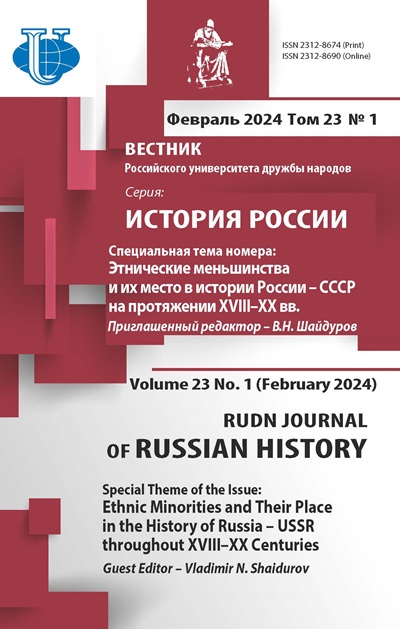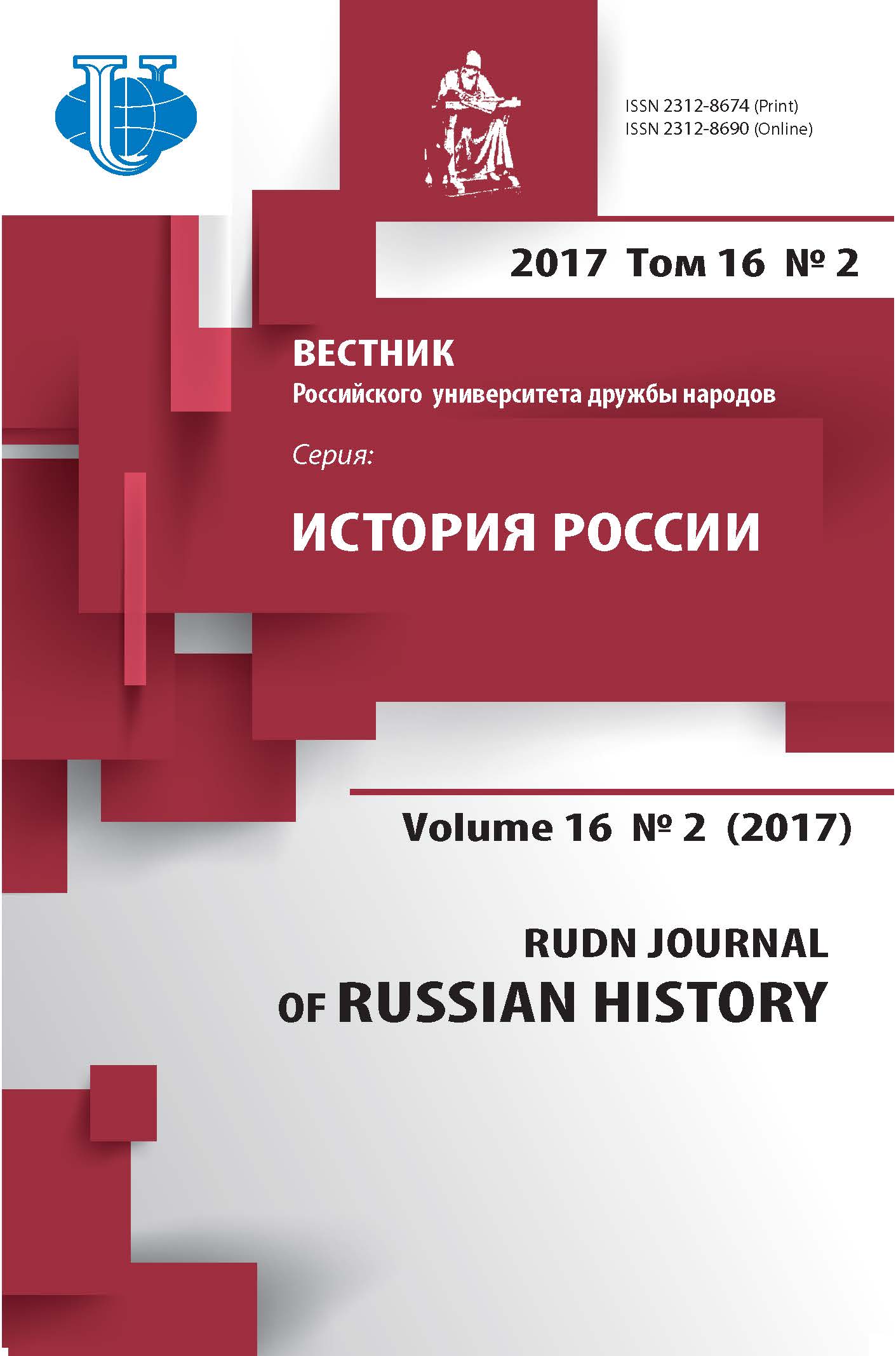HISTORY OF RUSSIAN REVOLUTION: ABDICATION OF TSAR OR REVOLT OF THE MASES?
- Authors: Buldakov V.P1
-
Affiliations:
- Institute of Russian History of Russian Academy of Sciences
- Issue: Vol 16, No 2 (2017)
- Pages: 153-173
- Section: 1917 YEAR: THE TUMULT, THE POVERTY, THE REVOLUTION? (TO UNDERSTANDING THE ESSENCE OF EVENTS)
- URL: https://journals.rudn.ru/russian-history/article/view/16653
- DOI: https://doi.org/10.22363/2312-8674-2017-16-2-153-173
Cite item
Full text / tables, figures
Abstract
The article shows that in 1917 it was the internal turmoil due to which the tsarist regime collapsed so fast. The crucial role was played by the common idea of the complete incapacity of Nicholas II. The image of the weak power was reinforced by all sorts of rumours about Rasputin’s influence on the government decision-making, his intimate relations with the Empress, and finally, the actions of the authorities in “the interests of Germany.” On the eve of the revolution Russia was rife with rumors of plots against the royal family. This meant that the public opinion was ready for the violent overthrow of the existing government. The dissatisfaction with the hateful government led to a spontaneous revolt, which met no serious resistance from the authorities. The disposal of the Romanovs aroused delight in the society. At the same time, the masses demanded the immediate deliverance from all the burdens of wartime. It could not provide new power. Everywhere crowds destroyed “tsarist” emblems and other attributes of the old power. Even the Russian Orthodox Church almost unanimously turned away from its formal chief. However, very soon it became clear that the political culture of the elites was at odds with the social aspirations of the people. The masses were increasingly called for the immediate solution to all vital problems - particularly to stop the war and immediately resolve the agrarian question. The study of the psychosocial situation in February - March 1917 assures that the monarchy was not so much overthrown by the insurgent people, but collapsed due to the internal incapacity. In fact, people only made the final blow to the exhausted authorities. Hence, the rebellious potential of the masses didn’t manifest itself in full. In this regard, the subsequent attempts of the liberal and right-wing politicians to squeeze the revolutionary process into the framework of formal democracy obviously failed.
About the authors
Vladimir P Buldakov
Institute of Russian History of Russian Academy of Sciences
Author for correspondence.
Email: kuroneko@list.ru
Dr. of History, Senior Researcher at Institute of Russian History of Russian Academy of Sciences
19, Dm. Uliyanova Str., Moscow, 117036, RussiaReferences
- Rozanov VV. V chadu voiny. Stat’i i ocherki. 1916-1918 gg [In fume of war. Articles and essays 1916-1918]. Moscow; 2008 (in Russian).
- Dokuchaeva VN. Boris Kustodiev. Zhizn’v tvorchestve [Boris Kustodiev. Life in creation]. Moscow; 1991 (in Russian).
- Nikol’skii BV. Dnevnik. 1896-1918 [Diary. 1896-1918]. St-Petersburg, 2015; 2 (in Russian).
- Gurko VI. Tsar ’i tsaritsa [Tsar and tsaritsa]. Paris; 1927 (in Russian).
- Vitte SYu. Izbrannye vospominaniya. 1949-1911 gg. [Selected memories. 1949-1911]. Moscow; 1991 (in Russian).
- Tolstoi II. Dnevnik. 1906-1916 [Diary]. St-Petersburg, 1997 (in Russian).
- Blok M. Koroli-chudotvortsy Ocherk predstavlenii o sverkh”estestvennom kharak-tere korolevskoi vlasti, rasprostranennykh preimushchestvenno vo Frantsii i v Anglii [The magic-working kings or The royal touch: sacred monarchy and scrofula in England and France]. Moscow; 1998 (in Russian).
- Shalyapin FI. Maska i dusha: Moi sorok let na teatrakh [Mask and soul: My forty years in theaters]. Moscow, 1990 (in Russian).
- Buldakov VP. Revolyutsiya kak problema rossiiskoi istorii [Revolution as a problem of Russian history]. Voprosy filosofii [Philosophical questions]. 2009; (1): 53-61 (in Russian).
- Tikhomirov LA. Khristianstvo i politika [Christianity and politics]. Apologiya Very iMonarkhii [The apology of faith and monarchy]. Moscow; 1999 (in Russian).
- Ganelin RSh., Florinskii MF. Rossiiskaya gosudarstvennost’ i Pervaya mirovaya voina [Russian statehood and the First World War]. Fevral’skaya revolyutsiya: ot novykh is-tochnikov к novomu osmysleniyu [The February Revolution: from new sources to new comprehension]. Moscow; 1998 (in Russian).
- Polishchuk NS. Otrazhenie samosoznaniya rabochikh v ikh pesennom repertuare [Reflection of workers’ self-awareness in their song repertoire]. Rossiiskiiproletariat: Oblik, bor’ba, gegemoniya [Russian proletariat: Image, struggle, hegemony]. Moscow; 1970 (in Russian).
- Bukhovets OG. Mental’nost’ i sotsial’noe povedenie krest’yan [Mentality and social behavior of peasant]. Mentalitet i agrarnoe razvitie Rossii [Russian mental and agrarian development]. Moscow; 1996 (in Russian).
- Bukhovets OG. Sotsial’nye konflikty i krest’yanskaya mental’nost’ v Rossiiskoi imperii nachala ХХ veka: novye materialy, metody, rezul'taty [Social conflicts and peasant mentality in Russian Empire at the beginning of 20th century]. Moscow; 1996 (in Russian).
- Kriger-Voinovskii EB. Zapiski inzhenera: Vospominaniya, vpechatleniya, mysli o revo-lyutsii [Engineer’s memoirs: memories, impressions, thought about revolution]. Sproge VE. Zapiski inzhenera [Engineer’s memoirs]. Moscow; 1999 (in Russian).
- Fuler U. Vnutrennii vrag: Shpionomaniya i zakat imperatorskoi Rossii [The inner enemy: spymania and sunset of Russian Empire]. Moscow; 2009 (in Russian).
- Sukhova OA. Desyat’ mifov krest’yanskogo soznaniya. Ocherki istorii sotsial’noi psikho-logii i mentaliteta russkogo krest’yanstva (konets XIX - nachalo ХХ v) po materialam Srednego Povolzh'ya [Ten myths of peasant consciousness. Historical essays of social psychology and Russian peasant mentality]. Moscow; 2008 (in Russian).
- Figes O., Kolonitskii B. Interpreting the Russian Revolution: The Language and Symbols of 1917. New Haven and London; 1999.
- Volkov-Muromtsev NV Yunost’: Ot Vyaz’my do Feodosii. (1902-1920) [The youth: from Vyazma to Feodosia]. Moscow; 1997 (in Russian).
- Stankevich VB. Vospominaniya 1914-1919 gg. [Memories 1914-1919]. Lomonosov Yu.V Vospominaniya o martovskoi revolyutsii 1917 goda [Memories about the March Revolution of 1917]. Moscow; 1994 (in Russian).
- Veselyi A. Rossiya, krov’yu umytaya [Russian, washed with the blood]. Moscow; 1990 (in Russian).
- Dalin VM. A.N. Savin: Nil admirari (Dnevnik istorika) [Nil admirari (historian’s diary)]. Istoricheskie etyudy o Frantsuzskoi revolyutsii: Pamyati V M. Dalina (k 95-letiyu so dnya rozhdeniya) [Historical essays of French Revolution: tribute to V.M. Dalin (95th anniversary)]. Moscow; 1998 (in Russian).
- Ioffe GZ. Velikii Oktyabr’i epilog tsarizma [The Great October and Tsarism epilogue]. Moscow; 1987 (in Russian).
- Shavel’skii G. Vospominaniyaposlednego protopresvitera russkoi armii i flota [Memoirs of the last protopresbyter of the Russian army and navy]. Moscow; 1996: 2 (in Russian).
- Serebrennikov II. Preterpev sud’by udary. Dnevnik 1914-1918 gg. [Having suffered destinies. Diary 1914-1918]. Irkutsk, 2008 (in Russian).
- Nikonov VA. Krushenie Rossii. 1917. [Russian collapse]. Moscow; 2011 (in Russian).
- Airapetov OR. Generaly, liberaly i predprinimateli: Rabota na front i na revolyutsiyu. 1907-1917 [Generals, liberalists and businessmen: work on the front and on the revolution 1907-197]. Moscow; 2003 (in Russian).
- Buldakov VP. Krasnaya smuta. Priroda i posledstviya revolyutsionnogo nasiliya [The Russian Troubles of the Early 20th Century as a Community Revolution]. Moscow; 2010 (in Russian).
- Lenin VI. Polnoe sobranie sochinenii [Full composition of writings]. Moscow: Politizdat. 1981. T. 31 (in Russian).
- Senin AS. Aleksandr Ivanovich Guchkov [Alexander Ivanovich Guchkov]. Moscow; 1996 (in Russian).
- Kozodoi VI. Aleksandr Ivanovich Guchkov i Velikaya russkaya revolyutsiya [Alexander Ivanovich Guchkov and the Great Russian Revolution]. Novosibirsk; 2015 (in Russian).
- Akhiezer A., Klyamkin I., Yakovenko I. Istoriya Rossii: konets ili novoe nachalo? [Russian history: the end or a new beginning?]. Moscow; 2005 (in Russian).
- Danilov VP. Krest’yanskaya revolyutsiya v Rossii. 1902-1922 gg. [The peasant revolution in Russia 1902-1922]. Krest’yane i vlast’ [The peasants and the power]. Moscow, Tambov, 1996 (in Russian).
- Buldakov VP., Leont’eva TG. Voina, porodivshaya revolyutsiyu [The war, which created the revolution]. Moscow; 2015 (in Russian).
- Buldakov VP. Quo vadis? Krizisy v Rossii: puti pereosmysleniya [Quo vadis? Crises in Russian: Ways of rethinking]. Moscow; 2007 (in Russian).
- Maslov B. Evolyutsionizm kak problema revolyutsionnogo soznaniya Evolutionism as a problem of revolutionary consciousness]. Russkaya intellektual’naya revolyutsiya 1910-1930-kh godov [Russian intellectual revolution]. Moscow; 2016 (in Russian).
- Buldakov V.P. Rossiiskie smuty i krizisy: vostrebovannost’ sotsial’noi i pravovoi an-tropologii [Russian times of troubles: The relevance of social and legal anthropology]. Rossiya i sovremennyi mir [Russian and the modern world]. 2001; (2): 31-46 (in Russian).
- Bezgin V. Povsednevnyi mir russkoi krest’yanki perioda pozdnei imperii [The everyday life of the Russian peasant woman of the late empire]. Moscow; 2017 (in Russian).
- Buldakov VP. Revolyutsiya i grazhdanskaya voina kak travma istoricheskoi pamyati [The Revolution and the Civil War as an injury of historical memory]. Vestnik Tverskogo gosudarstvennogo universiteta. Seriya: Istoriya. [Herald of Tver State University. History] 2007; (26): 5-27 (in Russian).
- [Buldakov VP. Revolyutsiya i istoricheskaya pamyat’: Rossiiskie parametry kliotravmatiz-ma [The Revolution and historical memory: Russian options of cliotraumatism]. Rossiya i sovremennyi mir. [Russia and the modern world]. 2008; (2): 98-115 (in Russian).
- Ruga V., Kokorev A. Povsednevnaya zhizn ’Moskvy. Ocherki gorodskogo byta v period Pervoi mirovoi voiny [Moscow everyday life. Essays of city life during the First World War]. Moscow, Vladimir, 2011 (in Russian).
- Lapshin VP. Khudozhestvennaya zhizn ’Moskvy i Petrograda v 1917 godu [Artistic life of Moscow and Petrograd in 1917]. Moscow; 1983 (in Russian).
- Rozanov VV. Apokalipsis nashego vremeni [Apocalypse of our time]. Sergiev Posad. 1917; (1): 1-11 (in Russian).
- Snesarev AE. Dnevnik: 1916-1917 [Diary: 1916-1917]. Moscow; 2014 (in Russian).
- Narskii IV. Zhizn ’ v katastrofe. Budni naseleniya Urala v 1917-1922 gg. [Life in disaster. Everyday life of Ural inhabitants in 1917-1922]. Moscow; 2001 (in Russian).
- Benua AN. Moi dnevnik. 1916-1917-1918 [My diary]. Moscow; 2003 (in Russian).
- Prishvin MM. Dnevniki 1914-1917 [Diaries]. Moscow; 1991 (in Russian).
- Mochul’skii KV. Aleksandr Blok. Paris, 1948 (in Russian).
- Krusanov AV. Russkii avangard: 1907-1932 (Istoricheskii obzor) [Russian avant-garde: 1907-1932 (Historical review)] In 3 volumes. Moscow; 2003: 2 (in Russian).
- Chegodaeva M. A. Rossii chernyi god [Russian black year]. Moscow; 1991. S. 9-10.
- Grabar’ I. Pis’ma. 1891-1917 [Letters]. Moscow; 1974 (in Russian).
- Grabar’ I. Pis’ma. 1917-1941 [Letters]. Moscow; 1974 (in Russian).
- Krugov GF. Gor’kaya dolya ili Pesnya o moei zhizni ot rozhdeniya do 45 let [Rough luck or song of my life since the birth until 45 years-old]. Pervaya mirovaya voina v ustnom i pis’mennom tvorchestve russkogo krest’yanstva. Novye materialy Pushkinskogo doma [The First World War in oral and written creation of Russian peasants. New facts of Puskin House]. St-Petersburg, 2014 (in Russian).
- Andreev LN. S.O.S.: Dnevnik (1914-1919). Pis’ma (1917-1919). Stat’i i interv’yu (1919). Vospominaniya sovremennikov (1918-1919) [Diary (1914-1917). Letters (1917-1919). Articles and interview (1919). Memoirs of contemporaries (1918-1919)]. Moscow, St-Petersburg: Atheneum-Feniks, 1994 (in Russian).
- Klerzhe GI. Revolyutsiya i Grazhdanskaya voina. Lichnye vospominaniya [Revolution and the Civil War. Wild memories]. Novosibirsk, 2012 (in Russian).
- Kolonitskii BI. Pogony i bor ’ba za vlast’v 1917 godu [Epaulets and fight for the power in 1917]. St-Petersburg; 2001 (in Russian).
- Kolonitskii BI. Simvoly vlasti i bor ’ba za vlast’: k izucheniyupoliticheskoi kultury rossii-skoi revolyutsii 1917 goda [The symbols of power and fight for power: To the study of the Russian revolution 1917]. St-Petersburg; 2001 (in Russian).
- Mordvintsev GV. Vesna 1917 goda v Bashkirii (khronika sobytii) [The spring of 1917 in Bashkiria]. Ufa; 2010 (in Russian).
- Belousov SV., Sukhova OA., Yudin SO. Penzenskaya guberniya v epokhu Pervoi mirovoi voiny [Penza Province at the age of The First World War]. Penza; 2015 (in Russian).
- Zarubin AG., Zarubin VG. Bez pobeditelei: Iz istorii grazhdanskoi voiny v Krymu [Without winners: From the history of the civil war in Crimea]. Simferopol’; 1997 (in Russian).
- Kolonitskii BI. «Tragicheskaya erotika»: Obrazy imperatorskoi sem’i v gody Pervoi mirovoi voiny [Tragic erotica: Images of the imperial family at the age of The First World War]. Moscow; 2010 (in Russian).
- Gippius Z. «Chernye tetradi» [Black notebooks]. Zven’ya. [Elements]. Vyp. 2 (in Russian).
- Zhizhek S. 13 opytov o Lenine [13 experiments about Lenin]. Moscow; 2003 (in Russian).
- Khabermas Yu. Filosofskii diskurs o moderne. Dvenadtsat’ lektsii [Philosophical discourse about Modern. 12 lessons]. Moscow; 2008 (in Russian).
- Buldakov VP. Fenomen rossiiskoi revolyutsii: mezhdu mifom i real’nost’yu [Phenomenon of Russian Revolution: between myth and reality]. RUDN Journal of Russian History. 2005; (4): 24-33 (in Russian).
















